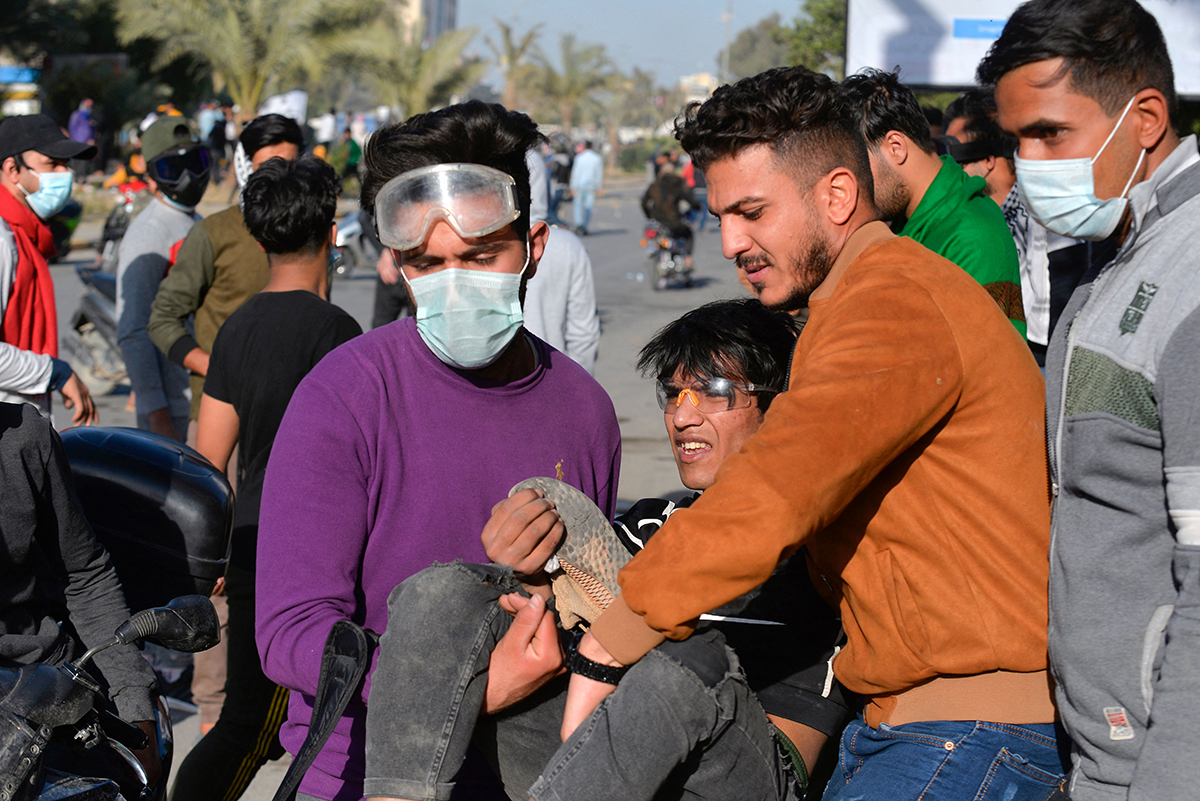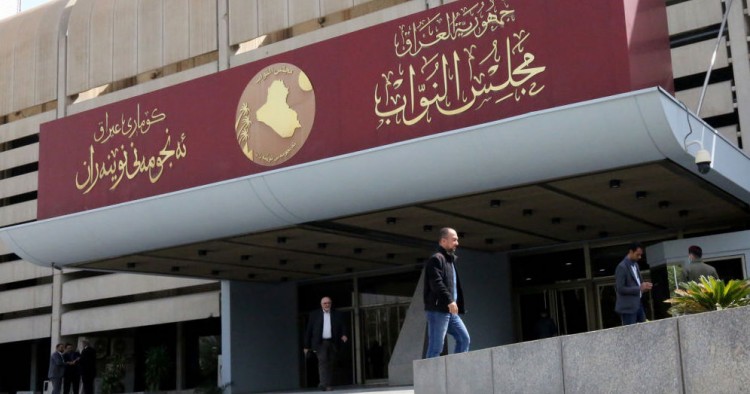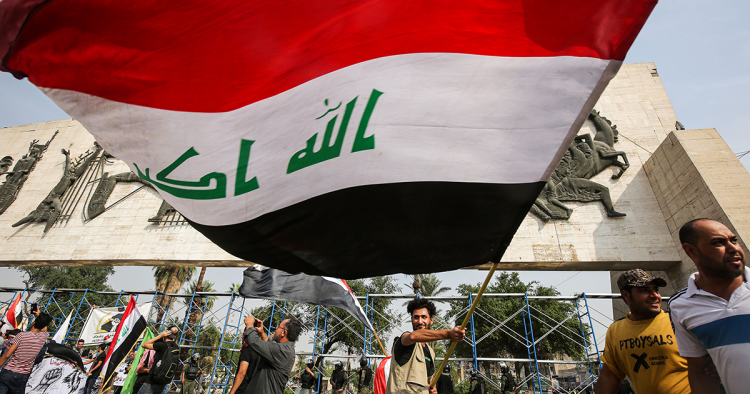With the approach of Iraq’s next parliamentary elections in October 2021, pro-reform candidates are facing troubling obstacles as they prepare to compete against the country’s establishment parties, which include armed militias that have dominated Iraq’s parliament since 2018. To ensure a fair electoral playing field, reformers are asking the international community to quickly step up elections-related assistance and planned oversight, as well as publicly reaffirm a readiness to call out observed violations.
Iraq’s government decided to hold the country’s first-ever early elections after weeks of sustained mass protests starting in October 2019 forced Prime Minister Adel Abdul-Mahdi to resign at the end of November 2019. His replacement, Prime Minister Mustafa al-Kadhimi, appears committed to making those early elections happen, which remains a central demand of the protest movement.
As the months passed, intermittent protests by smaller numbers of particularly fearless activists replaced the mass rallies, marches, and festival-like encampments of Iraq’s “October revolution.” Street traffic and the hustle and bustle of city life largely reclaimed Baghdad’s Tahrir Square and Nasiriyah’s Haboubi Square, the epicenters of movement activism. But the underlying grievances that sparked Iraq’s nonviolent mass uprising remain, and violent suppression by government forces and militias have only added more grievances.
According to U.N. reports, government and militia violence killed at least 490 peaceful protesters during the first seven months of protests at Tahrir, Nasiriyah, and other public squares. This grim figure, which Iraqi government statements confirm, does not account for related killings that occurred away from protest sites, nor does it include the dozens of assassinations and abductions that targeted leading activists and critics throughout 2020.
After months of violent suppression and intimidation, coupled with the impact of the global pandemic, the diminished scale and intensity of street protests were not entirely surprising. But those were not the only deterrents, explains Laith, a young activist from Baghdad who recently spoke with the authors.
In mid-December 2019, the lynching of a young man in Baghdad spread doubts about the movement’s commitment to nonviolence. A few weeks later, a U.S. drone strike killed Iranian general Qassim Soleimani and Iraqi militia leader Abu Mahdi al-Muhandis just outside Baghdad International Airport. This threatened to embroil protesters in a geopolitical standoff in which the stakes were far higher than they expected. Critics of the protests have used the incident to falsely recast the movement as a tool of “American subversion,” requiring violent suppression. By late February 2020, Iran-backed militias and other opponents of reform used this U.S. violation of Iraqi sovereignty to orchestrate a backlash against the protest movement, and numerous followers of Muqtada al-Sadr, once the protesters’ allies, turned on them. Afraid for the safety of their loved ones, family members pressured many protesters to lay low.
The protests themselves are no less an exercise of popular sovereignty than are free and fair elections. As a genuine grassroots social movement, protest organizers have actively sought to retain their independence and avoid even the appearance of foreign influence. It is not uncommon to hear protesters denouncing both the U.S. and Iran at the same event. No matter how much their critics may wish to recast them as the “sons of [foreign] embassies,” the protesters are in fact the sons and daughters of Iraq. They are determined to change the country’s political system to strengthen, rather than weaken, Iraqi sovereignty.
Our interviewee Laith became politically active as a college freshman. During the 2014-17 war against ISIS, when hundreds of thousands of families sought refuge in safer provinces, he joined other students in collecting donations and delivering aid to displaced families sheltering near the university. In October 2019, he attended the first rally and many subsequent rallies of the “October Revolution,” witnessing firsthand as shadowy snipers and security forces used live bullets against the crowds. He recounted numerous times when he and his friends rushed to the aid of injured protesters, helping them receive medical attention. Some whom they helped did not survive wounds from high-powered sniper rifles or heavy gas canisters improperly fired at close range.
Laith is just one of dozens of sources the authors interviewed over the past several months as part of a year-long study into Iraq’s pro-reform movement. To protect them, we are not using their full names or other identifying details.

Throughout 2020 and the spring of 2021, government and militia attacks on peaceful activists and opposition figures continued. For all the bad blood between them, Iraq’s political parties have found a common cause in prolonging Iraq’s ethno-sectarian power apportionment system, the muhasasa, and a common threat in the protesters who are leading the charge to end it.
Only a few of the recent attacks have received international attention, such as the July 6, 2020 assassination of Hisham al-Hashimi, a security analyst who had supported the protests and was close to Prime Minister Kadhimi. But shootings, bombings, kidnappings, and cases of torture are far more numerous than international headlines suggest. As Amnesty International reports, these attacks are part of a coordinated campaign of intimidation targeting protesters. Iraq’s powerful militias and the bulk of its establishment political parties are determined to prevent any organized opposition from threatening their hold on power.
Data from weekly monitoring reports of security incidents in Iraq reveal a continuous stream of bombings, drive-by shootings, and other killings throughout the second half of 2020 and the first quarter of 2021. Most recently, during the last week of February, Iraqi security forces used excessive force and live ammunition against demonstrations in Nasiriyah, killing five protesters and injured more than 200. Whether in the streets or online, protesters want justice for their fallen comrades, and they want jobs, social services, an end to corruption, and protections that will allow them to live in dignity in their own country.
Activists from Baghdad, Basra, Dhi-Qar, Najaf, and Maysan told the authors that militia attacks and threats forced many of their fellow activists who had played vital roles in organizing widespread protests, coordinating actions, and messaging to abandon their hometowns. Some have sought refuge in neighboring countries, while others have flocked to the relative safety of the Kurdistan Region.
Hardly a week passes without another assassination or kidnapping targeting protest leaders and opposition candidates. Others reported that militias attacked their homes once the groups learned they had returned from exile even for a few hours to see their families after months of separation.
We recently spoke with Talal al-Hariri, the founder of a new political party called the October 25 Movement (OTM), born out of the protests. He relocated to the Kurdistan Region after receiving threats in Baghdad for his openly secular views. He accused Iran-backed militias and Islamist political parties of using violence to stifle dissent. “The tax we pay for secularism is huge. I had to leave Baghdad because of this. We are facing an Iranian arsenal.”
Justice remains a distant goal. While authorities have opened numerous investigations into the violence, arrests have been sporadic at best. Headlines hailed the arrest of a few suspects on February 15 as a precedent, despite dozens of other cases, including large-scale atrocities in which militia leaders have hardly hidden their involvement.
For Laith and some of his colleagues, the violence and threats have been crippling: “We have not been able to translate our position into organized political action,” he told the authors in December. Among other risks, “one cannot become a candidate [to run for election] because of threats and attacks by the electronic armies,” a reference to smear and incitement campaigns the social media platforms run by Iran-backed militias organized. Laith added that, “people fear the militias will repeat what al-Qaeda did in Ninewa [in targeting election candidates].” Days after we talked with Laith, chilling security footage showed gunmen as they moved to assassinate a Baghdad lawyer who planned to run for election.
Although security concerns have taken their toll on young activists’ ability to organize, they have not entirely stopped them. Laith insists he and his colleagues remain determined to mobilize networks of students and recent graduates across provinces to create an alternative to the establishment parties.
Azhar al-Rubaie, a journalist covering the protests in Basra, doesn’t believe the violence will stop the movement. Protest leaders, he told the authors, “have faced bullets and threats ... and they expect more of this if they run for public office. ... [T]hey don't fear more violence and [know] the road is not paved with rose petals.”
Even those who brave the threats are not guaranteed a chance to compete for public office. Talal, a political science graduate, pointed out a serious challenge facing the movement: Most groups that previously considered competing in elections ran out of time before they could finalize their registration with Iraq’s Independent High Electoral Commission (IHEC), which had given political parties just one week to submit their applications. When we spoke, out of eight known political parties formed by activists affiliated with the protest movement, only Talal’s OTM party had managed to complete the registration process. Shortly after we talked, two more activist-formed groups, Emtidad and al-Bayt al-Watani, completed the registration process. Those three parties — four if we count the Marhala, a party comprising activists associated with Prime Minister Kadhimi — will compete amid a field of 249 registered parties.
The 25-year-old Talal, who is three years below the qualifying age to run for parliament, argues that many of the registered parties are proxies for establishment parties that funded them to field young candidates to broaden their appeal. Until February 17, the cost to register one candidate was about $4,000, the equivalent of four months’ pay for an Iraqi civil servant, at a time when government paychecks are far from certain. According to Talal, the establishment parties have been trying to sow confusion and doubt about new parties. He believes that Hezbollah and the Islamic Radio and Television Union, the information arm of Iran-backed factions across the region, organized this deliberate disinformation campaign.

Voter turnout for elections will be a critical battle. The pandemic, apparent voter apathy, and IHEC’s limited capacity to update voter records and issue millions of new biometric voter cards are all factors that threaten to leave many eligible voters unable to vote in October. Activists worry that a repeat of the low voter turnout in 2018 will give establishment parties, with their easy-to-mobilize, patronage-funded bases, a chance to dominate the polls once again.
IHEC’s progress on the biometric registration process has been less than reassuring. In February, the U.N. Assistance Mission to Iraq (UNAMI) said IHEC had completed biometric registration of 14.8 million eligible voters out of a total of 25.1 million. A month later, only another 3% of voters had updated their records and nearly 12 million voters were still awaiting their biometric voter cards. At the current rate that records are being updating — 13,900 per day, according to UNAMI — IHEC will need more than two years to finish the job, but the deadline is March 31.
Laith, the Baghdad activist, believes the registration process disproportionately favors establishment parties, who “use government offices and mosques” to update the records of their followers. Hana, a female activist from Baghdad, agrees. She told the authors in December that most establishment party loyalists had already obtained their voter cards. Hana, who had organized volunteers and logistical support to help protesters after October 2019, expressed frustration that ordinary people have not yet learned the lessons of 2018, and accused the establishment parties of seeking to disrupt efforts by civil society organizations to educate eligible voters about the need to update their voter registration records.
Activists also fear that powerful parties may use out-of-date records to create fraudulent ballots to inflate their results. To fight that, Laith says he and his colleagues are urging people “to update their voter records and obtain the biometric card.” Iraq’s president and prime minister agree that biometric cards are critical for preventing voter fraud. While voters may use older electronic voter cards to vote, many Iraqis view them as untrustworthy, and UNAMI considers the biometric cards a “valuable contribution to the integrity of elections and, accordingly, an important and urgent task for IHEC.”
Complicating efforts to elect reform candidates, some young people are “calling for a boycott,” explains Ameer, another Baghdad activist who joined protests in 2015. The belief that casting a vote would legitimize an inevitably fraudulent outcome in favor of establishment parties is behind such calls.
Talal and his colleagues recognize this problem: “Seventy percent of our efforts are about [voter] education for mobilization. ... [The 2018] boycott in fact aided fraud. People must participate. If you don’t vote, the [government] parties will steal your vote. We’re educating people that elections are existential and can produce change.”
Being displaced from their hometowns makes the activists’ job even harder. “We have nothing but social media,” Talal tells us. “[Working] on the ground, it’s difficult. We are seeing some success, though.”
Protesters-turned-party-leaders like Talal still maintain hope that the new election system, with its smaller electoral districts, will help voters get to know the candidates better and give independents a fighting chance. A new election law parliament passed in November — another key demand of the protesters — features individual candidates and non-transferable votes, making it “better than the Sainte-Laguë system,” Talal explains, referring to the proportional representation system Iraq used in previous elections. “You can work and achieve tangible results in a small district. ... [T]he larger districts were vulnerable to political money and fraud.” Ammar, a male activist from Basra, agrees that the election system Iraq adopted in 2005 was instrumental in cementing the muhasasa system. The proportional representation and “closed list” system produced a parliament that “became a decision-making body of [half a dozen] oligarchs to whom all MPs owe allegiance for winning their seats,” he argued.
Talal has hope that his OTM party and other protester-led parties will get their foot in the door. “It won’t be a landslide, but we’ll make a difference because there’s a desire for change and total rejection [of the political elites].” He expects that, “a million [voters] will answer the call” and vote for candidates, representing the protest movement and popular demands for reform.
Positive change will be slow at best, even if that prediction proves correct. Protesters may manage to get a few dozen of their colleagues into the halls of Iraq’s parliament, but it will take more than that to transform a political system that corrupt elites, who see reform as an attack on their own interests, have long dominated.
The integrity of Iraq’s next election is nonetheless consequential, beyond what the results may mean for any one party or coalition. It is the key to a peaceful solution to Iraq’s economic and political crises. The promise of early elections put the pin back in the proverbial grenade of Iraq’s popular protests. Conducting a timely and fair election that gives the new generation of Iraqi protesters a seat at the table could go a long way toward restoring faith in the possibility of peacefully achieving gradual change from within. That might keep the pin in place.
And gradual change may be Iraq’s only way out of its crisis. The emergence of a reform-minded bloc in Iraq’s parliament could provide precious political backing to a like-minded prime minister. It could stiffen the next government’s resolve to take bolder action to fight corruption, enact long-overdue economic reforms, and restore sovereignty, without which the specter of political failure and violent conflict over ever-shrinking national resources looms large.
With limited resources and no protection from the excesses of the state or militias, the new protester-led parties still face a severe disadvantage. They do not expect outside actors to give them money or weapons, but they do want the international community to monitor the elections, and if fraudulent or unfair elections produce an illegitimate outcome, they expect the world to behave accordingly.
Erik K. Gustafson is the Founder and Executive Director of the Enabling Peace in Iraq Center (EPIC), an organization dedicated to the advancement of Iraq's peace and development. He is a U.S. Army veteran of the 1991 Gulf War and an Iraq analyst focusing on human rights and humanitarian affairs. Omar Al-Nidawi is a Middle East analyst focusing on Iraqi political, security, and energy affairs. He is a Program Manager at EPIC, a Truman national security fellow, and a guest lecturer of Iraqi history and politics at the Foreign Service Institute. The opinions expressed in this piece are their own.
Photo by AHMAD AL-RUBAYE/AFP via Getty Images
The Middle East Institute (MEI) is an independent, non-partisan, non-for-profit, educational organization. It does not engage in advocacy and its scholars’ opinions are their own. MEI welcomes financial donations, but retains sole editorial control over its work and its publications reflect only the authors’ views. For a listing of MEI donors, please click here.













